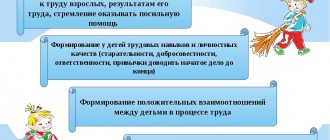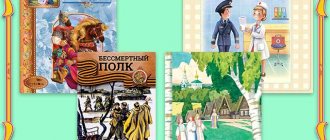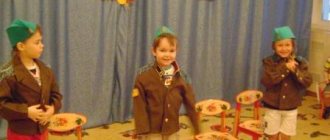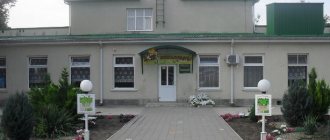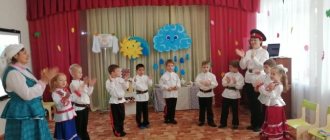MAGAZINE Preschooler.RF
"Moral and patriotic education of preschool children."“Patriotism does not mean only love for the motherland. It's much more than that. This is the consciousness of one’s inalienability from one’s homeland, an integral experience with it of its happy and unhappy days ,” wrote A. N. Tolstoy.
Children of preschool age have access to a feeling of love for their family, their hometown, their native nature, their homeland. This is precisely the beginning of patriotism, which is born in knowledge, and is formed in the process of purposeful education. Currently, patriotic education of preschool children according to the Federal State Educational Standard is relevant and a priority for the younger generation. Children in preschool age are very active, inquisitive, proactive, and have amazing abilities for sympathy and empathy. This is the time that is favorable for the development of patriotism and spirituality.
Having examined the methodological recommendations for patriotic education, it should be noted that patriotism is a feeling of love for the Motherland, a sense of duty to it, and a readiness to defend one’s country at any time. Home and family are the most important institutions that help a child instill warm feelings for the Motherland. Many parents do not think about this direction in the development of the child, therefore, a preschool educational institution is also called upon to enlighten and give valuable advice on instilling patriotism in preschoolers.
I believe that a child’s sense of homeland begins with love for the closest people - mother, father, grandmother, grandfather, brother, sister. And his home, the yard where he walked more than once, and the view from the apartment window. Kindergarten, where he gets the joy of communicating with peers, and native nature - all this is the Motherland. How many discoveries does a child make every day? And although many of his impressions are not yet realized by him, it all begins with admiration for what the little man sees in front of him. Each of us should know the history, traditions, culture of our people, our native nature, feel a sense of belonging to our family, our city, our country, the nature of our native land, the cultural heritage of the people, and respect representatives of other nations, their traditions and customs .
Thus, the moral and patriotic education of children is one of the main tasks of a preschool educational institution.
The main tasks can be identified as follows:
- developing a caring attitude towards nature and all living things
- the formation of tolerance, a sense of respect for other peoples and their traditions.
- formation of basic knowledge about human rights
- developing pride in the achievements of one's country.
- development of interest in Russian traditions and crafts
- expanding ideas about Russian cities
- introducing children to the symbols of the state
- developing a sense of responsibility and pride for the country's achievements
- nurturing a child’s love and affection for his family, home, kindergarten, street, city
- instilling respect for work
These tasks are solved in all types of children's activities: in classes, in games, in work, in everyday life - as they instill in the child not only patriotic feelings, but also form his relationships with adults and peers.
Moral and patriotic education of a child is a complex pedagogical process. It is based on the development of moral feelings.
All of the above determined for me the relevance and choice of topic: . ” The following stages of work can be distinguished.
The importance of moral and patriotic education for the harmonious development of a child’s personality
I began studying the chosen topic with the selection and analysis of literature.
Moral and patriotic education of preschool children is a complex pedagogical process. It is based on the development of the child’s moral feelings. “Those high moral feelings that characterize a developed adult and which are capable of inspiring him to great things are not given to a child ready-made from birth. They arise and develop throughout childhood under the influence of social conditions of life and upbringing ,” wrote A.V. Zaporozhets.
Love for the Motherland is brought up in children under the influence of the surrounding life. The targeted influence of parents and preschool teachers in instilling feelings of patriotism is becoming a normal phenomenon.
Feelings of love for the Motherland are expressed from love and affection for loved ones, for a family where the child is surrounded by care, attention, and affection. Gradually, the feeling of love and respect for family expands and is transferred to other people - preschool workers, neighbors, acquaintances. By adopting the behavior of adults, children learn the tone, manner, and ideas that exist in the family. Children sensitively understand the peculiarities and nature of relationships between people.
For a small child, the Motherland begins with his native place - from the street on which he lives, where his kindergarten is located. Gradually, children get an idea about their hometown, village, get acquainted with the sights of the street on which they live, learn about what their city, village is famous for, and begin to be proud of it. Preschoolers will learn about people who glorified themselves through their work and military merits, and whose names are given to cities, streets, and squares.
A kindergarten is a child’s second family, where he is surrounded by the attention, love and care of the preschool staff. Children develop respect for the work of those who raise them, treat them, feed them, and take care of the cleanliness of the premises. By observing the work of a nanny, laundress, cook, janitor and other workers, children understand the meaning of their actions aimed at creating cleanliness and comfort in the kindergarten, providing children with delicious food, and filling their lives with meaningful, interesting activities. Preschoolers will learn about the technical equipment of work, the coordinated, collective nature of work, aesthetics and culture. Children will learn about his social assessment of people's work - awards and encouragements.
Moral and patriotic education helps the child develop skills in relationships with adults and peers; interest in Russian traditions and customs develops; there is a feeling of responsibility and pride for the country’s achievements, a feeling of attachment to one’s family, home, kindergarten, street, district, country, and respect for work.
Creation of a subject-development environment
At the next stage of work, to implement moral and patriotic education, it was necessary to create a developmental environment, taking into account the age characteristics of children.
It was decided to create a corner of Russian culture in the group, a corner of state symbols; produce and purchase manuals, fiction, didactic games on moral and patriotic education.
The corner of Russian culture includes:
- fiction
- folk musical instruments
- folk toys
- works of decorative and applied art
The government activity corner includes:
The following didactic manuals have been produced: “What is good and what is bad?” , “Cities are heroes” , “Who is the odd one out” , “Lay out the pattern” , “Who lives where?” , “Find the flag” , “Collect the flag” , “Moscow is the capital of the Russian Federation” , “Tell me about your city” , “Russian heraldry” , “Heraldry of Orenburg”
Albums “Pages of the Great Patriotic War” , “Sights of Orenburg” , “Orenburg Down Shawl” , “National Village of Orenburg” ,
Didactic material in pictures “My home, my family” ,
Card index of didactic games on moral and patriotic education.
Set of cards “Space” , “Tell the children about the Moscow Kremlin” , “Moscow Kremlin”
Picture dictionary “The main holidays of the country”
Developmental tasks for children “Stories about professions”
Riddles for children “Polite words”
By the end of the preschool period, the child should know: people of different nationalities live in our country, each nation has its own language, its own customs and traditions, art and architecture; Every nation is talented and rich in craftsmen, artists, musicians...
Thus, when solving the problems of moral and patriotic education, each teacher must build his work in accordance with local conditions and characteristics of children.
Working with parents.
No less important is the correct style of relations between the teaching and parent teams, which develops as a result of the systematic work of the kindergarten with parents. Close cooperation between kindergarten teachers and family members, involving family members in the pedagogical process, holding conversations, thematic meetings, creating a subject-specific development environment in the family and kindergarten.
The group actively works with parents of students. The work carries out a number of tasks:
- Spend holidays and weekends with children.
- Involve your child in family activities.
- Tell and show your child the sights of the city.
- Talk about the exploits of the heroes of the Great Patriotic War, read the memory of them.
- Tell your child about your work and how the work of his parents benefits society.
- Tell the story of your family, about its traditions, about your ancestors.
- Create a family tree together.
Patriotic education is also combined with all other areas of the state standard:
- speech development
- child development in musical activity - labor training
- development of elementary natural scientific concepts
- development of ecological culture
- development of ideas about man in history and culture
- physical development and health
- artistic development.
It is possible to achieve success in patriotic education only when the teacher himself knows and loves the history of his country, his city. He must be able to select the knowledge that will be truly accessible to preschool children, so that it can evoke a feeling of delight and pride in children.
When raising the future generation, we must remember that society needs the right creator of our state, full of strength and energy. The future of our country largely depends on how the tasks of patriotic education are solved.
| Next > |
Features of the formation of patriotic feelings in children of middle preschool age
Bibliographic description:
Chisnikova, I. A. Features of the formation of patriotic feelings in children of middle preschool age / I. A. Chisnikova. — Text: direct // Innovative pedagogical technologies: materials of the VI International. scientific conf. (Kazan, May 2022). - Kazan: Buk, 2022. - pp. 63-66. — URL: https://moluch.ru/conf/ped/archive/214/12299/ (access date: 01/13/2022).
The article examines the pedagogical and methodological foundations and features of the process of forming patriotic feelings and civic identity of preschool children in a modern preschool educational institution.
Key words: development, formation, patriotic feelings, civic identity, preschool children
Formulation of the problem. Modern preschool education is based on the principle of the unity of the educational space of the Russian Federation. It is implemented in the tasks of ensuring equal opportunities for the full development of each child during preschool childhood and creating conditions for the continuity of the content of education implemented within the framework of various educational programs. The state program “Patriotic education of citizens of the Russian Federation for 2016–2020” was approved by Decree of the Government of the Russian Federation No. 1493 of December 30, 2015. It identified the main ways of patriotic education, goals and objectives, which are aimed at maintaining social and economic stability, strengthening unity and Friendship between nations.
The patriotic feeling is revealed and strengthened even in preschool age; it does not require special careful cultivation, for it is as natural and inevitable as a feeling of family affection, every day, every hour, every event and phenomenon, just like all the pictures of the surrounding life and the surrounding nature, helps it grow and develop better than any any educational activities.
The development of the theory and practice of patriotic education is characterized by the outstanding pedagogical experiments of A. S. Makarenko, V. A. Sukhomlinsky, aimed at educating a patriotic citizen in the team, which are still relevant today. In the 60–80s. XX century The theory and practice of patriotic education is reflected in the scientific works of Yu. K. Babansky, A. V. Barabanshchikov, A. N. Vyrshchikov, V. A. Karakovsky, V. I. Kovalev, M. N. Terenty and others. In modern Science has different opinions on the issue of the essence of patriotism.
In the “Concept of Patriotic Education” (A.K. Bykova), patriotism is considered from the position of individual self-awareness, formed in a market economy and presupposing a rational relationship between public and personal in the implementation of the constitutional duty of a citizen to protect state interests.
The researcher believes that at the level of personal qualities, patriotism is love for the big and small Motherland, readiness to fulfill a constitutional duty, a modern patriotic worldview, corresponding attitudes and values, social (including religious and national) tolerance, socially significant behavior and activities. The given list of personal qualities correlates with the main components of patriotism - consciousness, relationships and activity - and can be considered as the ultimate goal of patriotic education in the unity of spirituality, citizenship and social activity of the individual [3, p.41].
Such a variety of opinions is due to the complexity of the phenomenon under consideration. Based on this, it is necessary to clarify the essence and content of patriotism, since the effectiveness of patriotic education depends on the precise definition of the initial concepts and provisions.
The definition of patriotism as a moral feeling does not fully reflect its essence, since moral feelings are a person’s experiences of his relationship to the surrounding reality, actions and actions, and norms of responsibility. Patriotism presupposes an individual’s experience of his relationship to the Motherland, Fatherland, awareness of his patriotic duty, as well as the desire to realize it.
In the structure of patriotic feelings, as in other personal qualities, the following structural components can be distinguished:
- cognitive;
- emotional-sensual (views, beliefs, emotions);
- active.
One of the components in the structure of patriotic feelings that most researchers highlight is the cognitive component. The basis of patriotic consciousness is knowledge of a patriotic nature, on the basis of which patriotic views and beliefs are developed. Beliefs reveal the unity of a person’s moral knowledge and feelings. They are an ideological and psychological component of consciousness that directly stimulates human behavior, the choice of actions and deeds. “Under the influence of worldview, a strong structure of personal motivation arises, in which views and beliefs have a decisive influence” [2, p. 10–11].
However, knowledge turns into personal beliefs only in the process of human activity. In addition, it is in practical activities that a person demonstrates his beliefs and develops the necessary skills. This highlights the third component in the structure of the concept of “patriotic feelings” - the activity component.
As the previous analysis of the concept of “patriotic feelings” shows, all works devoted to this problem emphasize the active, active nature of patriotism, manifested in a person’s practical activities for the benefit of the Motherland, in serving the Fatherland. All this gives grounds to highlight the activity component in the structure of this concept.
All selected components are closely related and represent an integral unity. These components constitute “a complete set from which not a single component can be excluded without violating the conditionality” [1, p. 7], that is, they are necessary and sufficient to characterize the concept of “patriotic feelings”.
In this regard, the definition of the concept of “patriotic feelings” in modern conditions should, in our opinion, be based on historical, general philosophical, psychological and pedagogical principles that reflect the specifics of this concept, take into account the processes of democratization and depoliticization of pedagogical science and the education system, strengthening the personal aspect in educational work with the younger generation. An important point in determining the content of patriotic feelings is to strengthen the relationship between the personal significance of patriotism and its collectivistic nature.
Love for the Motherland as the highest moral feeling determines the transformation of the needs of society and the Fatherland into the own needs of the individual. All forms of love express a person’s need for other people and the desire to be needed and to be useful. Patriotism, like collectivism, absorbs the unity and diversity of personal and social goals, cooperation, and interaction of people. This determines the personality’s focus not only on one’s own “I”, but also outside oneself, on other people, which is expressed in the desire to interact, be useful, and sympathize.
A manifestation of this is a person’s awareness and fulfillment of his patriotic duty. In modern conditions, the content of this concept remains unchanged: the unity of public and personal interests of a person, a citizen. However, the emphasis shifts somewhat. It is also important, in our opinion, to shift the emphasis in the awareness of patriotic duty to the personal interests of a person.
Age-related psychological characteristics of children of middle preschool age depend on the previous psychological development of children of primary preschool age, on their readiness for a sensitive response to the educational influences of adults. Here we present the most typical, most frequently encountered indicators of age-related psychological characteristics of children of middle preschool age. This is the period of initial personality formation:
- the emergence of emotional anticipation of the consequences of one’s behavior;
- emergence of self-esteem;
- complication and awareness of experiences;
- enrichment with new feelings and motives of the emotional-need sphere.
Preschool childhood is a very special period of child development. During these years, further physical development and improvement of the child’s intellectual capabilities occur. His movements become free, he speaks well, the world of his sensations, experiences and ideas is richer and more diverse.
In assessing the level of development of any type of children’s activity, two most important characteristics can be distinguished:
- The degree of mastery of activity as a way for a child to convey his vision of reality. For example, when a child designs, he conveys his idea of how a house, car, or ship works. When he draws an image of his mother, his family, it is often not done very skillfully, but the degree of complexity of the work, the way its details are worked out, are the most important indicators of the development of children's activity.
- The level of mastery of the operational and technical side of the activity, namely, mastery of the necessary skills. For example, in visual arts this could be mastering the technique of painting with gouache, pastel, or watercolor. In applique - mastery of scissors, glue, cardboard (paper).
The main goal of education with this approach is the development of the preschooler’s personality; personality acts as a system-forming factor in organizing the entire educational process; the leading motives of education and its value are self-development and self-realization of all subjects of preschool education; the formation of strong knowledge, skills and abilities becomes a condition for ensuring the competence of the individual; the full competence of the person being educated is ensured by including his subjective experience; The goal of personality-oriented education is the development of independence, responsibility, stability of the spiritual world, and reflection.
Conclusion. Person-centered education is the process of preserving and ensuring the health of the child. The development of his natural abilities - the mind, moral and aesthetic feelings, the need for activity, mastering the initial experience of communicating with people, nature, and art. The immediate environment and the Motherland as personal values in the structural and content model reflect the child’s desire to love the immediate environment, his parents, and through them his Motherland as a whole.
This is a real transformative force that elevates the objective dignity of a person, making him a subject of his own activity. Knowledge, which is considered outside the axiological context, turns into impersonal information, leading to the loss of the moral and spiritual responsibility of the individual for the picture of the world that he or she has formed.
Literature:
- Federal State Educational Standard for Preschool Education (approved by order of the Ministry of Education and Science of the Russian Federation dated October 17, 2013 No. 1155, registered with the Ministry of Justice of Russia on November 14, 2013 No. 30384) - access mode: //www/firo.ru/? page_id=11678.
- State program “Patriotic education of citizens of the Russian Federation for 2016–2020.” - access mode // www.rosvoencentr-rf.ru/obobshchennye-doklady/razrabotka-gpp-2016–2020-iyun-noyabr/utochnennyy-variant-gosprogrammy. php.
- Sotnikova S.V. Patriotic education of preschoolers using fiction [Text] / S.V. Sotnikova, A.S. Belkina // Pedagogical experience: theory, methodology, practice: materials of the VI International. scientific-practical conf. (Cheboksary, February 19, 2016) / editorial board: O. N. Shirokov [et al.]. - Cheboksary: CNS "Interactive Plus", 2016. - No. 1 (6). — pp. 286–287. — ISSN 2412–0529.
Key terms
(automatically generated)
: patriotic education, preschool age, feeling, Russian Federation, immediate environment, children's activities, preschool childhood, personal interest of a person, psychological characteristics of middle school children, Motherland.
